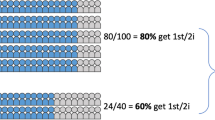Abstract
This paper develops a conceptual framework to understand the value of an increasing number of university study programmes that send students to the global south to learn through volunteering. We ask what determines the benefit that these activities bring to the host community. To understand this, we conceptualise these activities as student volunteerism and propose a framework to understand the value of these activities based on a previously developed framework for volunteer tourism. We examine a single case study of a minor programme in a Dutch university, exploring how course design and student selection affect student behaviour as an antecedent step to creating student benefits. We identify six kinds of factors that appear to promote ‘deeper’ (better) contributions and argue that these six factors require further analysis to better realise university contributions to societal development in Global South contexts.


Similar content being viewed by others
References
Barbieri, C., Santos, C. A., & Katsube, Y. (2012). Volunteer tourism: On-the-ground observations from Rwanda. Tourism Management, 33(3), 509–516.
Barkham, P. (2006). Are these the new colonialists? The Guardian. Retrieved from https://www.theguardian.com/society/2006/aug/18/internationalaidanddevelopment.education. Accessed 15 Dec 2017.
Brodie, J. (2006). Are gappers really the new colonialists? The Guardian. Retrieved from http://www.theguardian.com/travel/2006/aug/26/gapyeartravel.guardiansaturdaytravelsection?CMP=share_btn_link. Accessed 15 Dec 2017.
Brown, S. (2005). Travelling with a purpose: Understanding the motives and benefits of volunteer vacationers. Current Issues in Tourism, 8(6), 479–496.
Brown, S., & Morrison, A. M. (2003). Expanding volunteer vacation participation an exploratory study on the mini-mission concept. Tourism Recreation Research, 28(3), 73–82.
Callahan, M., & Thomas, S. (2005). Volunteer tourism: Deconstructing volunteer activities within a dynamic environment. Niche Tourism: Contemporary Issues, Trends, and Cases, 183–200.
Carpenter, J., & Myers, C.K. (2007). Why Volunteer? Evidence on the Role of Altruism, Reputation, and Incentives, IZA Discussion Paper No. 3021, p. 36.
Chen, L. J., & Chen, J. (2011). The motivations and expectations of international volunteer tourists: a case study of “Chinese Village traditions”. Tourism Management, 32, 435–442.
Cnaan, R. A., Smith, K. A., Holmes, K., Haski-Leventhal, D., Handy, F., & Brudney, J. L. (2010). Motivations and benefits of student volunteering: Comparing regular, occasional, and non-volunteers in five countries. Canadian Journal of Nonprofit and Social Economy Research, 1, No 1, Fall / Autumn 2010, 65–81.
Coghlan, A., & Noakes, S. (2012). Towards an understanding of the drivers of commercialization in the volunteer tourism sector. Tourism Recreation Research, 37(2), 123–131.
Gibbons, M., Limoges, C., Nowotny, H., et al. (1994). The new production of knowledge: The dynamics of science and research in contemporary societies. London: Sage.
Guttentag, D. A. (2009). The possible negative impacts of volunteer tourism. International Journal of Tourism Research, 11(6), 537–551.
Guttentag, D. A. (2011). Volunteer tourism: as good as it seems? Tourism Recreation Research, 36(1), 69–74.
Guttentag, D. A. (2012). Volunteer tourism has gone commercial: the reasons and the implications. Tourism Recreation Research, 37(3), 273–275.
Hammersley, L. A. (2014). Volunteer tourism: building effective relationships of understanding. Journal of Sustainable Tourism, 22(6), 855–873.
Holdsworth, C., & Quinn, J. (2010). Student volunteering in English higher education. Studies in Higher Education - STUD HIGH EDUC, 35, 113–127.
Holmes, K., Smith, K. M., Lockstone-Binney, L., & Baum, T. G. (2010). Developing the dimensions of tourism volunteering. Leisure Sciences, 32(3), 255–268.
Lupoli, C., Morse, W. C., Bailey, C., & Schelhas, J. (2014). Assessing the impacts of international volunteer tourism in host communities: a new approach to organizing and prioritizing indicators. Journal of Sustainable Tourism, 22, 898–921.
Lyons, K., Hanley, J., Wearing, S., & Neil, J. (2012). Gap year volunteer tourism. Myths of global citizenship? Annals of Tourism Research, 39(1), 361–378.
McGehee, N. G. (2014). Volunteer tourism: evolution, issues and futures. Journal of Sustainable Tourism, 22(6), 847–854.
Mcgloin, C., & Georgeou, N. (2015). “Looks good on your CV”: the sociology of voluntourism recruitment in higher education. Journal of Sociology, 1–15.
Popham, G. (2015). Boom in “voluntourism” sparks concerns over whether the industry is doing good | Reuters. Reuters. Retrieved from http://www.reuters.com/article/2015/06/29/us-travel-volunteers-charities-idUSKCN0P91AX20150629. Accessed 15 Dec 2017.
Rehberg, W. (2005). Altruistic individualists: motivations for international volunteering among young adults in Switzerland. Voluntas: International Journal of Voluntary and Nonprofit Organizations, 16(2), 109–122.
Sin, H. L. (2009). Volunteer tourism: “Involve me and I will learn”? Annals of Tourism Research, 36(3), 480–501.
Smith, K., & Holmes, K. (2009). Researching volunteers in tourism: going beyond. Annals of Leisure Research, 12(3–4), 403–420.
SSH REB. (2005). Guidelines for ethical conduct in participant observation. University of Toronto Social Sciences and Humanities Research Ethics Board. https://doi.org/10.1186/1472-6963-9-110.
Taplin, J., Dredge, D., & Scherrer, P. (2014). Monitoring and evaluating volunteer tourism: a review and analytical framework. Journal of Sustainable Tourism, 22, 874–897.
Wearing, S., & McGehee, N. (2013). Volunteer tourism: a review. Tourism Management, 38, 120–130.
Zahra, A., & McGehee, N. G. (2013). Volunteer tourism: a host community capital perspective. Annals of Tourism Research, 42, 22–45.
Acknowledgements
An earlier version of this paper was presented at the European Higher Education Society conference in Porto, Portugal, September 2017. This work has been supported by COMPETE: POCI-01-0145-FEDER-007043 and FCT – Fundação para a Ciência e Tecnologia within the Project Scope: UID/CEC/00319/2013. The work was also undertaken as part of the “Crossing Borders” First Cycle Minor programme at the University of Twente. The authors would like to thank the host organisation and the interviewees for their candid responses. Any errors or omissions remain the responsibilities of the authors.
Author information
Authors and Affiliations
Corresponding author
Rights and permissions
About this article
Cite this article
Cunha, J., Mensing, R. & Benneworth, P. A conceptual framework to understand student volunteerism. Tert Educ Manag 25, 31–44 (2019). https://doi.org/10.1007/s11233-018-09012-x
Published:
Issue Date:
DOI: https://doi.org/10.1007/s11233-018-09012-x




